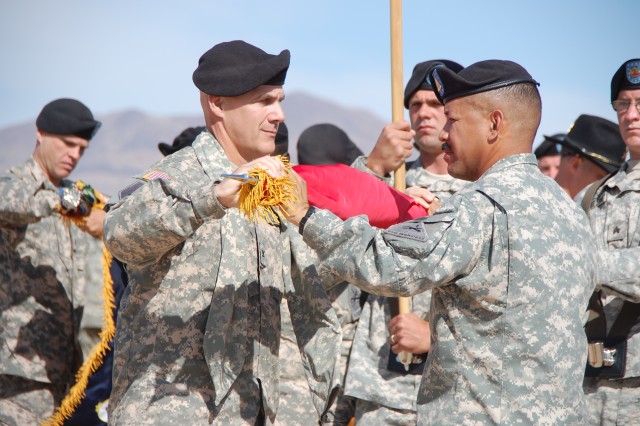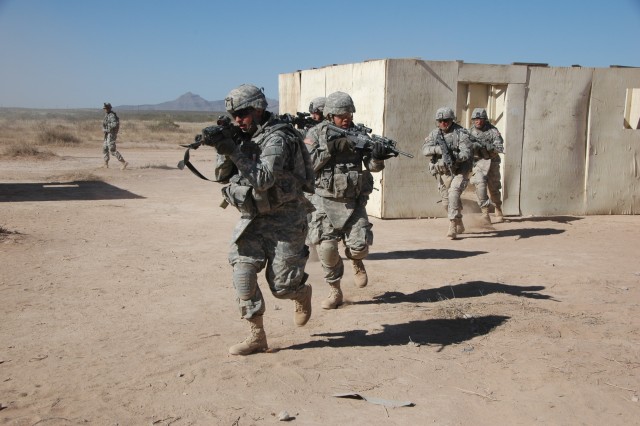WASHINGTON (Army News Service, May 1, 2009) - A city manager's course, civil affairs training and a border patrol class have not been typical training for brigade combat teams headed to Iraq - until now.
The 4th Brigade Combat Team of the 1st Armored Division from Fort Bliss, Texas, is headed to southern Iraq and will serve as "proof of principle" for a new "advise and assist" brigade concept.
At least six other brigades are also training to deploy under this new stability operations concept, said Col. Peter Newell, 4-1st AD, brigade commander.
"I know that there are at least six, if not eight, other brigades who are in the pipeline to deploy behind me who are taking the lessons learned from me, from our training, and starting to look at their processes," Newell said during a blogger's roundtable Thursday.
The "advise and assist" brigades will assist Provincial Reconstruction Teams in their missions, will work directly with Military Transition Teams to train Iraqi Army units and with the teams that train the Iraqi Border Patrol and police. The brigades will also work closely with the State Department, U.S. Aid and other government agencies, as well as non-governmental organizations in their area.
Newell's brigade underwent 10 months of unique pre-deployment training as the first "advise and assist" BCT.
State Department officials embedded with his brigade during its rotation at the National Training Center in California's Mohave desert during January.
"We were actually fortunate to have what I call the collective brain trust of the State Department's Iraqi Stabilization Desk ... all embedded in the rotation," Newell said.
Under the new concept, provincial reconstruction teams - civil affairs servicemembers and State Department officials -- will team up with brigades going through their mission readiness exercises at NTC and other combat training centers, Newell said. The MiTT teams will also train with the brigades, he said.
After NTC, the brigade sent a core group of about 60 junior NCOs and officers to Fort Bragg for two weeks of civil affairs training. "And then that core group went into downtown El Paso, working with a number of the industries to actually do assessments and practice some of the tasks that they'd actually assist the provincial reconstruction teams in performing," Newell said.
About 20 of his Soldiers attended a city manager's course in Austin, Texas. The El Paso city manager's office also worked with the troops to help them understand essential city services.
"For instance, if there's sewage backup in the streets," Newell said, "it's helpful to know where to look to find the problem and the person who might be able to solve it.
"Now, we're not creating experts, but we are creating people who have very good problem-solving skills," Newell said.
Another 60 Soldiers attended a five-day class with the Border Patrol. Newell said these Soldiers will partner with the Division of Border Enforcement units in Iraq.
"The advantage to us here in El Paso is we have an extensive border and some of the similar problems that you'll find in the Iraqi border in terms of ports-of-entry smuggling and trafficking of people and lethal accelerants." Newell said.
"So the Border Patrol actually stepped in to help just a great deal.
"It really has been a significant collaborative event from lots of folks across the government," he said.
In addition to the stability operations training, the brigade also underwent full-spectrum combat training. Newell said he expects that his troops would be able to switch gears from civil support and move into combat, if needed, on short notice.
Along with the training, his brigade received $60 million in new equipment, Newell said. The new M2-A3 Bradley Fighting Vehicles were fielded with the 4-1st, along with new command-and-control systems, new intelligence systems, and new field artillery systems.
"I don't know that there was any part of the brigade, as part of our reset, that we weren't fielding and trying to conduct new equipment training on something new," Newell said.
In Iraq, the brigade will be responsible for three provinces in the southern portion of the country: Dhi Qar, Maysan, and Al-Muthanna. It will be part of Multi-National Division-South which has taken over from the British in Basra. The 34th Infantry Division of the National Guard will assume the MND-South lead.
"One of the changes that I didn't talk about up front in terms of our relationship with the provincial reconstruction teams and civil capacity is that we are looking hard at taking one of the battalions and putting it in, specifically, a role that supports the three -- and probably eventually four -- provincial reconstruction teams we work with," Newell said.
The battalion headquarters will not "boss" the PRTs, Newell said, but will have a primary mission of supporting the provincial reconstruction teams.
Another change unique to the advise and assist brigades is that MiTT and Police Training Teams will be stood up and actually assigned to the brigade combat teams before deployment, Newell said.




Social Sharing